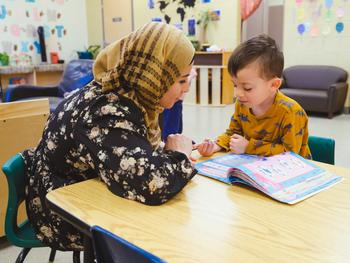Behaviour Guidance

Behaviour Guidance
The goal of any behaviour guidance is for children to learn to manage their own behaviour and interactions with others. Children will be encouraged to solve problems by identifying them, thinking about alternatives, making decisions, and talking it over with their friends. Behaviour guidance is used in a positive and caring way as opposed to punishing children. It is intended to promote self-care, self-regulation, and an awareness of the effects of one’s actions on others.
Minor behavioural issues are dealt with by UFCC staff as they happen through supportive redirection. If a recurring behaviour issue occurs, UFCC staff will advise the family and enlist support in resolving it. This may involve requesting resources from outside service providers to help resolve the situation.
All families are required to sign/follow the Rights and Expectations of Children, Families, and Staff document, which is available on UFCC’s family communication app, as well as review our Equity, Diversity, Inclusion, and Belonging Statement.
UFCC staff are not permitted to use harsh measures that would humiliate a child, withhold basic needs, confine a child in a locked area, or physically punish children. All UFCC staff, students and volunteers are required to review and sign the Equity, Diversity, Inclusion and Belonging Statement upon joining UFCC and annually thereafter.
Further, UFCC staff are not permitted to use any of the prohibited practices as outlined by the Child Care and Early Years Act, 2014, including:
- Corporal punishment of the child.
- Physical restraint of the child, such as confining the child to a high chair, car seat, stroller, or other device for discipline or supervision, unless the physical restraint is for the purpose of preventing a child from hurting himself, herself or someone else, and is used only as a last resort and only until the risk of injury is no longer imminent.
- Locking the exits of the child care centre or home child care premises for the purpose of confining the child or confining the child in an area or room without adult supervision, unless such confinement occurs during an emergency and is required as part of the licensee’s emergency management policies and procedures.
- Use of harsh or degrading measures or threats or use of derogatory language directed at or used in the presence of a child that would humiliate, shame, or frighten the child or undermine his or her self-respect, dignity or self-worth.
- Depriving the child of basic needs, including food, drink, shelter, sleep, toilet use, clothing, or bedding.
- Inflicting any bodily harm on children, including making children eat or drink against their will.
School Suspensions
In the case where a kindergarten or school age child is suspended from school, the child will not be allowed to attend the UFCC program until the school suspension period has ended. This action is dictated by the Education Act, which stipulates that a student is not permitted on school property while suspended. UFCC staff and the school work as partners and endeavor to support each other in these difficult situations.
Please note that daily fees are still required during the term of suspension.
Electronic Devices
Children participating in UFCC programs are expected to abide by all school policies, including policies for the use of electronic devices. If the use of phones and electronic games are not allowed at the school, use of these devices will not be allowed in UFCC programs.
UFCC discourages children from bringing personal electronic devices to the program. Most UFCC programs have access to computers and electronic devices that children can use on a limited basis during program time. UFCC is not responsible for loss or damage of personal electronic devices should children bring these to the program.